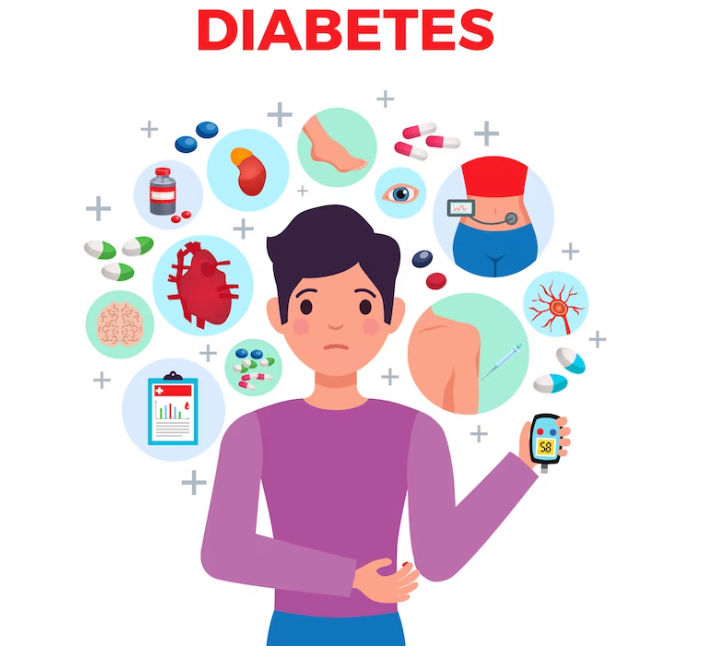Diabetes Management
Diabetes-related Brain Fog: Recognising the Symptoms
2 min read
By Apollo 24|7, Published on - 03 September 2024
Share this article
0
0 like
.jpg?tr=q-80)
If you're living with diabetes, you may sometimes experience a lack of mental clarity, also known as brain fog. This phenomenon indicates an altered mental state, characterised by confusion, forgetfulness, and a decreased ability to focus. It might seem minor, but persistent brain fog can have a significant impact on your overall quality of life.
Spotting the Symptoms of Brain Fog
Brain fog due to diabetes might manifest in various ways. You could notice mental fatigue, frequent forgetfulness, or feel irritable more often. Other signs include difficulty in concentrating, a reduced attention span, or problems with multitasking. Also, if you find yourself often feeling disoriented, it could be due to brain fog.
Tracing the Causes of Brain Fog
When it comes to diabetes and brain fog, blood sugar levels play a crucial role. Both high and low blood sugar levels can cause brain fog. In addition to this, fluctuating blood sugar levels can also affect your cognitive function. Reduced supply of oxygen and nutrients - a common complication in diabetes - can also result in mental fogginess.
Understanding Who's at Risk
Certain factors increase the risk of experiencing brain fog. These include uncontrolled or fluctuating blood sugar levels, high-stress levels, older age or a history of Alzheimer's or dementia.
Prevention and Management Tips
The key to managing brain fog is effective diabetes control. Maintaining a balanced diet, regular exercise regime, and good sleep patterns can keep your blood sugar levels in check and reduce the risk of brain fog. Stress management is equally important as high stress levels can exacerbate symptoms. If you notice persistent brain fog, consult your doctor for early intervention.
At Apollo, we believe in providing comprehensive healthcare support for individuals dealing with type 2 diabetes. Our Apollo Super 6 programme offers personalised assistance to help you manage diabetes better through lifestyle modifications and expert consultations. This programme focuses on improving diet, encouraging physical activity, and offering dedicated support, all tailored to your individual needs.
Diabetes Management
Consult Top Diabetologists
View AllLeave Comment
Recommended for you

Diabetes Management
Mindful Wound Care for Diabetic Individuals
Slow wound healing can be a significant challenge for diabetics, but the right care can change this. Some ways to promote healing include regular foot checks, maintaining optimal blood sugar levels, proper wound cleaning and dressing, relieving pressure on wounds, and seeking medical attention.

Diabetes Management
Can Diabetes Be Diagnosed Without Symptoms?
Asymptomatic diabetes demands early detection. Screening tests like Fasting Blood Glucose, Oral Glucose Tolerance, and HbA1c are crucial. Early diagnosis enables prompt treatment, lifestyle adjustments, and complication prevention. Regular check-ups are vital for effective diabetes management.

Diabetes Management
Navigating Through Emotional Challenges in Diabetes Management
Diabetes management involves dealing with emotional challenges as well as controlling blood sugar levels. Effective strategies such as practicing relaxation techniques, seeking support, setting realistic expectations, avoiding self-blame, rewarding yourself, practicing mindfulness, keeping a mood diary, communicating with loved ones, seeking professional help when necessary, and managing diabetes burnout can play a significant role in managing overwhelming emotions related to diabetes.
Subscribe
Sign up for our free Health Library Daily Newsletter
Get doctor-approved health tips, news, and more.
Visual Stories

8 Fruits That are Incredibly Healthy for Diabetes
Tap to continue exploring
Recommended for you

Diabetes Management
Mindful Wound Care for Diabetic Individuals
Slow wound healing can be a significant challenge for diabetics, but the right care can change this. Some ways to promote healing include regular foot checks, maintaining optimal blood sugar levels, proper wound cleaning and dressing, relieving pressure on wounds, and seeking medical attention.

Diabetes Management
Can Diabetes Be Diagnosed Without Symptoms?
Asymptomatic diabetes demands early detection. Screening tests like Fasting Blood Glucose, Oral Glucose Tolerance, and HbA1c are crucial. Early diagnosis enables prompt treatment, lifestyle adjustments, and complication prevention. Regular check-ups are vital for effective diabetes management.

Diabetes Management
Navigating Through Emotional Challenges in Diabetes Management
Diabetes management involves dealing with emotional challenges as well as controlling blood sugar levels. Effective strategies such as practicing relaxation techniques, seeking support, setting realistic expectations, avoiding self-blame, rewarding yourself, practicing mindfulness, keeping a mood diary, communicating with loved ones, seeking professional help when necessary, and managing diabetes burnout can play a significant role in managing overwhelming emotions related to diabetes.



